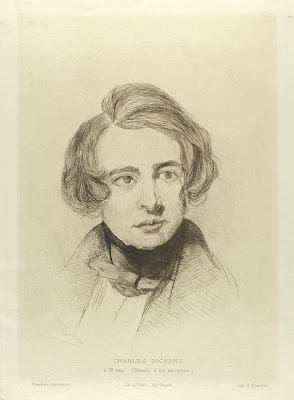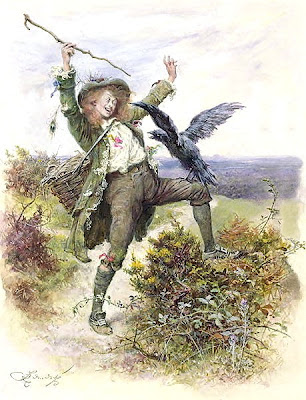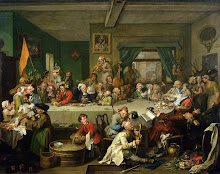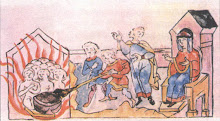Saturday, March 23, 2013
Wednesday, March 13, 2013
Edgar Allan Poe, Insurance Salesman
As part of my ongoing efforts to have the two most peculiar blogs on the Internet, over at the sister site, I've posted an advertisement from 1890 where they used "The Bells" to nag people into buying fire insurance.
You never know where Poe will turn up next.
Monday, March 4, 2013
The Fever Called Blogging
In what I can only assume was a moment of madness, I started a new blog: Strange Company. I’m not sure how to describe it—it’ll have no particular theme other than chatting about incidents and people from history that happen to appall/interest/amuse me. In other words, it’ll probably be an incoherent mess.
| Yeah, Edgar's agreed to come along for the ride. |
I don’t intend to give up on this blog altogether, but I’m in the mood for finding new ways to make a pest of myself, and thought I’d give this new project a whirl. If any of you decide to take a look, I hope you find something you feel is worth a few moments of your time. I’m kicking things off with the story of a nameless, legless man who became one of Nova Scotia’s most famous mysteries.
See you!
Friday, March 1, 2013
Poe and Charles Dickens

Poe and Dickens were two very different writers. They spent their lives in separate countries, only met on two brief occasions, and their known correspondence is scanty and impersonal. However, their careers still intersected in various significant ways--which seems only fitting for two of the most renowned writers of the 19th century.
Poe’s interest in Dickens’ work began very early. In his first published mention of the English author, a review of “Watkins Tottle and Other Sketches” in the June 1836 issue of the “Southern Literary Messenger,” he referred to Dickens’ stories as “old and highly esteemed acquaintances.” He went on to describe the author as a “far more pungent, more witty, and better disciplined writer of sly sketches, than nine-tenths of the Magazine writers of Great Britain.”
In the November “Messenger” Poe said “The Posthumous Papers of the Pickwick Club” (which had just appeared in a pirated American edition) “fully sustained” his earlier glowing opinion of Dickens. “The author possesses nearly every desirable quality in a writer of fiction, and has withal a thousand negative virtues…we can only express our opinion that his general powers as a prose writer are equaled by few.”
Poe gave a brief review of “Nicholas Nickleby” in the December 1839 “Burton’s Magazine.” He called it perhaps Dickens’ best work to date, declaring boldly, “Charles Dickens is no ordinary man, and his writings must unquestionably live.”
Two years later, Poe reviewed “Master Humphrey’s Clock” and “The Old Curiosity Shop” for the May 1841 issue of “Graham’s Magazine.” As befitted his increased maturity as a critic, Poe’s analysis was more detailed and judgmental than his earlier reviews. When taking note of the somewhat muddled aspects of the works, he went so far as to suggest that “…the rumors in respect to the sanity of Mr. Dickens, which were so prevalent during the publication of the first numbers of the work, had some slight, some very slight foundation of truth.” He suspected that some of the narratives “were probably sent to press to supply a demand for copy,” and asserted that “Mr. Dickens did not precisely know his own plans when he penned the five or six first chapters of the ‘Clock.’”
When focusing on “The Old Curiosity Shop,” Poe wrote a lengthy paragraph itemizing its various shortcomings, including the complaint that Dickens endowed his characters “with a warmth of feeling so very rare in reality. Above all, we acknowledge the death of Nelly is excessively painful; that it leaves a most distressing oppression of spirit upon the reader, and should, therefore, have been avoided.”
It’s very interesting indeed to observe a tender-hearted Poe chastising Dickens for his grimness.
Although Poe found many minor details to criticize, he saw much to praise in the work’s overall conception. He wrote, “The plot is the best which could have been constructed for the main object of the narrative.” The depiction of love between grandfather and grandchild was “indeed most beautiful. It is simple and severely grand. The more fully we survey it, the more thoroughly are we convinced of the lofty character of that genius which gave it birth.”
He went on to extol the “imagination” and “originality,” displayed in “The Old Curiosity Shop.” “[Imagination] is the one charm all potent, which alone would suffice to compensate for a world of more error than Mr.Dickens ever committed.”
In the May 1 issue of the “Saturday Evening Post,” Poe examined the first few installments of “Barnaby Rudge,” which was then being published as a serial. His predictions for how the story would play out were not terribly accurate. (He would later blame this on Dickens’ shortcomings as a novelist: “We did not rightly prophesy,” he later wrote in his most delightfully Poeish manner, “yet, at least, our prophecy should have been right.”)
The February 1842 “Graham’s” contained Poe’s long, highly detailed, and not altogether flattering analysis of the now-completed “Rudge.” Obviously realizing his criticisms might be unpopular, he defended himself in advance with the ingenious assertion that fault-finding was the highest form of flattery:
“Those who know us will not, from what is here premised, suppose it our intention, to enter into any wholesale laudation of ‘Barnaby Rudge.’ In truth, our design may appear, at a cursory glance, to be very different indeed. Boccalini, in his ‘Advertisements from Parnassus,’ tells us that a critic once presented Apollo with a severe censure upon an excellent poem. The God asked him for the beauties of the work. He replied that he only troubled himself about the errors. Apollo presented him with a sack of unwinnowed wheat, and bade him pick out all the chaff for his pains. Now we have not fully made up our minds that the God was in the right. We are not sure that the limit of critical duty is not very generally misapprehended. Excellence may be considered an axiom, or a proposition which becomes self-evident just in proportion to the clearness or precision with which it is put. If it fairly exists, in this sense, it requires no farther elucidation. It is not excellence if it need to be demonstrated as such. To point out too particularly the beauties of a work, is to admit, tacitly, that these beauties are not wholly admirable. Regarding, then, excellence as that which is capable of self-manifestation, it but remains for the critic to show when, where, and how it fails in becoming manifest; and, in this showing, it will be the fault of the book itself if what of beauty it contains be not, at least, placed in the fairest light. In a word, we may assume, notwithstanding a vast deal of pitiable cant upon this topic, that in pointing out frankly the errors of a work, we do nearly all that is critically necessary in displaying its merits. In teaching what perfection is, how, in fact, shall we more rationally proceed than in specifying what it is not?”
Although Poe had many flattering comments about the completed work, he faulted Dickens’ handling of the plot, as well as the general construction of the novel.
The names of Dickens and Poe were next linked through a minor literary guessing-game. In October 1842, "American Notes," Dickens’ account of his visit to the United States, was released. His critical, if not mocking, views of the country unsurprisingly caused American publications to return his disparagement, with interest. One of the most vigorous rebuttals to Dickens’ work was a pamphlet called “English Notes,” which was published under the pseudonym of “Quarles Quickens” two months later. For all its patriotic fervor, it was an inferior piece of work, and soon vanished nearly without a trace. It was forgotten by all except the most passionate collectors of Dickensiana until 1912, when an eccentric literary scholar named Joseph Jackson attributed the authorship of “English Notes” to Poe, largely on the basis that Poe first published “The Raven” under the name “Quarles.”
As so often happens when researchers fall in love with their own theories, Jackson was forced to essentially turn to writing fiction to support his argument. In March of 1842, Poe and Dickens met in Philadelphia, where the former secured the latter’s promise to help him secure an English publisher. Jackson took this snippet of fact to assume that, when Poe failed to hear from Dickens for some months afterwards, he became so embittered that, a la Griswold, he was inspired to take a savage literary revenge for this presumed neglect. When Poe did hear from Dickens in November, the Englishman apologized for his delay in answering and proved that he had tried—albeit unsuccessfully—to find Poe a publisher. Unfortunately, it was too late to recall the insulting pamphlet. However, Dickens’ reference to Poe as an “unknown writer” so offended Poe personally that he used the name “Quarles” when publishing “The Raven” as a way of publicly showing Dickens what he really thought of him.
To summarize what was a long and rather tiresome debate: Jackson claimed to see in “English Notes” similarities with Poe’s known writings that eluded virtually everyone else except—as one observer suggested—book dealers and collectors hoping to increase the value of their otherwise worthless copies of “English Notes.” (One notable exception is Poe biographer Mary E. Phillips. In her 1926 “Edgar Allan Poe: The Man,” she expended many characteristically rambling and incoherent pages in arguing that Poe did indeed write “English Notes”--and several other relevant anonymous articles besides. Unfortunately, all she proved was that as a historian, she had a good deal more energy than sense.)
Although the idea that Poe was the author of “English Notes” has long been dismissed, it is true that at one point Poe fancied he had a grudge against Dickens. In January 1844 a review of Rufus Griswold’s anthology “Poets and Poetry of America” appeared in London’s “Foreign Quarterly Review.” The anonymous critic thought little of the collection as a whole, and personally offended Poe by suggesting he was a mere imitator of Tennyson. For someone with Poe’s obsession about plagiarism, this slur on his own originality was extremely irritating.
Poe believed Dickens was the author. He wrote James Russell Lowell that it was denied that Dickens wrote the review, “but, to me, the article affords so strong internal evidence of his hand that I would as soon think of doubting my existence.”
We now believe that Poe was wrong in his assertion that Dickens was responsible for the article that so outraged him (although the author was likely Dickens’ close friend John Forster.) In any case, whatever Poe may have privately thought about the Englishman, it did not affect his critical acumen. He remained as supportive of Dickens’ writings as ever.
Soon after Poe moved to New York in the spring of 1844, he sent a series of seven “letters” to the “Columbia Spy,” published under the title “Doings of Gotham." In his May 27 "letter" Poe compared Bulwer-Lytton's upcoming visit to America with Dickens' tour two years before. “The Gothamites,” he wrote sardonically, “not yet having made sufficient fools of themselves in their fete-ing and festival-ing of Dickens, are already on the qui vivi to receive Bulwer in a similar manner. If I mistake not, however, the author of ‘The Last Days of Pompeii’ will not be willing ‘to play Punch and Judy’ for the amusement of the American rabble…When I spoke of Bulwer’s probably refusing to do what Dickens made no scruples of doing, I by no means intended a disparagement of the latter. Dickens is a man of far greater genius than Bulwer.”
The most famous link between these two literary giants is suggested by Poe’s final review of “Barnaby Rudge.” He regretted that the title character’s pet raven was not used to its fullest. “Its croaking might have been prophetically heard in the course of the drama. Its character might have performed, in regard to that of the idiot, much the same part as does, in music, the accompaniment in respect to the air.”
Yes, it is generally acknowledged that Dickens’ ghastly, grim, and ancient Grip, prone to croaking “Nobody” at ominous moments, provided a germ of suggestion for Poe’s even more famous bird--one of the most felicitous examples in literature of one great artist unwittingly providing inspiration to another.

It is curious that the Poe/Dickens connection essentially ended there. Poe never reviewed Dickens’ subsequent writings again, and there is no evidence he read them. It is as if, after “The Raven,” he had no further interest in his contemporary.
On Dickens’ side, his attitude was even more unfortunately indifferent. He seemed unfamiliar with Poe’s body of work, and while his personal attitude towards Poe was far from unfriendly, he showed no interest in pursuing their brief acquaintance.
Perhaps, however, Dickens had a deeper regard for Poe than we know. It was said that during his second visit to America in 1868, he took the trouble to look up Poe’s ever-beleaguered aunt/mother-in-law Maria Clemm, and “generously entreated her acceptance of one hundred and fifty dollars with the assurance of his sympathy.”
(Image of Dickens via NYPL Digital Gallery; Barnaby Rudge and Grip by Fred Barnard c. 1870 via Wikipedia.)
Subscribe to:
Posts (Atom)

















